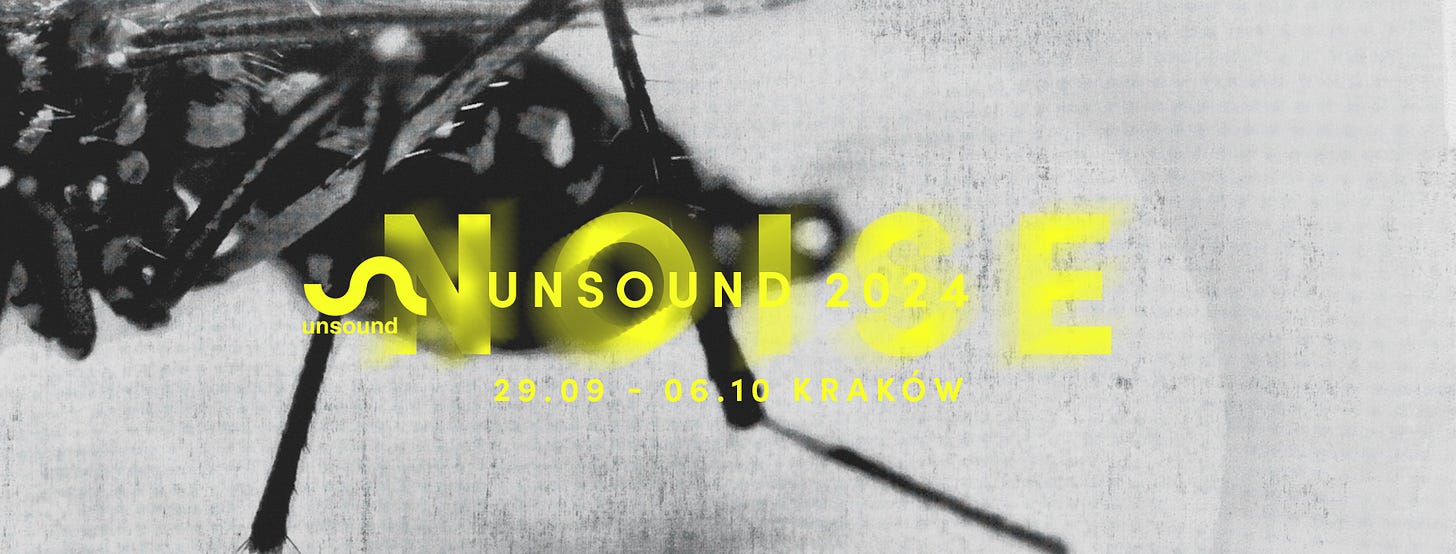(A Short) Introduction
At the end of last year, we shifted the Unsound newsletter into Substack. Subscribers will continue to receive regular pieces of writing about music, culture, technology – and sometimes news. Today’s Unsound Dispatch falls into the second category – with an announcement about the Unsound Kraków 2024 theme: NOISE. As always, the theme description is a collective effort, with various people involved in formulating ideas and getting them in written form.
Beneath the news and theme description, especially for Substack subscribers, we also take a look back at The Machine Listening Songbook, presented at Unsound 2023.
See you soon in Krakow!
Mat Schulz, Unsound Artistic Director
The twenty-second edition of Unsound Krakow will take place from September 29th - October 6th this year, around the theme NOISE.
So, What the fuck is Noise? 1
NOISE, the conventional thinking goes, is unwanted sound: pops and scratches on a vinyl record, the ringing of tinnitus, the din of traffic. But this immediately gives rise to questions: unwanted by whom? and why? Noise is also an effect of the human condition: you can shut your eyes, but you cannot close your ears.
Music is one way humans make sense of a world of noise. But sometimes music becomes noise, and vice versa. As a genre, noise music’s roots are in the machinery and cities of the Industrial Revolution, posing a challenge to the neat division between the musical and non-musical. Noise music takes the idea of 'unwanted sound' and flips it on its head. But noise also lies outside genre; and if noise/silence is an enduring binary, it is a false one, because silence is also a type of noise.
In 2024, technology aspires to be barely audible, with muted whirs from our ultrathin laptops and electric cars. Technology also creates silence in relation to our surroundings, be it via noise-cancelling headphones, or – paradoxically – white-noise devices played as we sleep. But silence is a phantom – never fully attainable (there is always something quiet, even in the background). It is also a command (think of a judge shouting ‘silence!’ in a courtroom). Silence can also be unbearable: humans are known to grow anxious in anechoic chambers, scientifically soundproofed rooms so quiet that John Cage once claimed he could hear the noise of blood pumping through his veins.
Even when we can’t hear technology, it hears us – via machine listening and infrastructures, surveillance, the monitoring of our online behavioural patterns. At a time of information warfare, when every claim to truth is embattled, social media also generates noise, our attention diverted by clashing voices, monetised controversy, and troll farms stoking engagement. Noise is excess, the sound of ‘too much’.
Finally, noise unavoidably conjures soundscapes of brutality: violence, war, and conflict. Noise is not just a product of warfare; it can even be a weapon in itself (think stun grenades, menacing drones, sound cannons, piercing sirens). Against all this is the noise of protests, mass resistance, and solidarity. The politics of noise is also a politics of listening. Who gets to speak, and who is heard?
Echoing last year’s in(ter)vention series, Unsound 2024 will also explore the notion of NOISE as an interruption or disturbance in usual lineups – sonically, but also in conceptual terms, where the unruly and uncontrolled logic of noise takes hold, where the need to ‘make sense’ might be temporarily suspended.
Unsound usually doesn’t have an open call for the music program, but with NOISE as the theme, we’re making an exception. You can send us ear-shredding work, sure, but we’re particularly interested in less literal, perhaps more playful interpretations of NOISE, somehow subverting the word. We also welcome submissions to the discourse program. Finally, there is a call for NOISE in(ter)ventions. The cut off date for the open call is April 30th. Submissions this year must be made via the official online form, which you can find here.
Passes will go on sale in May, along with the first lineup announcement.
From Unsound 2023: The Machine Listening Songbook
For Substack subscribers, we wanted to take a look back at last year’s Unsound and the Machine Listening collective’s Machine Listening Songbook, which uses voice cloning technology to ‘reconfigure the relationship between voices and texts, lyrics and their expression, in vocal performance and composition’. The pieces were all in(ter)ventions, created in response to the Unsound 2023 theme: Dada/Data. They were presented across multiple venues and in different contexts.
Clone Ursonate is a reading of Kurt Schwitters’ classic 20th-century sound poem Ursonate (1932) by a clone:
Screeching Phonograph works with the text of Tristan Tzara’s Dada Manifesto (1918) as the raw material for a performance on a club sound system:
To quote Machine Listening: ‘Oh God comes out of our collective surprise when we asked OpenAI’s Whisper to transcribe Clone Ursonate, and what it produced was the phrase ‘oh god’, repeated again and again. Of course, these words never appear in Schwitters’ text, but they seemed to capture a sense of exasperation at the impossible task they’d been set, which perhaps shades into wonder at the technological sublime’:
Again to quote Machine Listening: ‘Orchard Farming is a reading of Baroness Elsa von Freytag-Loringhoven 1927 poem by a chorus of clones, which preserves and reworks the piece’s proto-concrete poetry for the digital age’:
The Machine Listening collective is made up Joel Stern, James Parker and Sean Dockray. These pieces were made using Dockray’s Word Processor.





